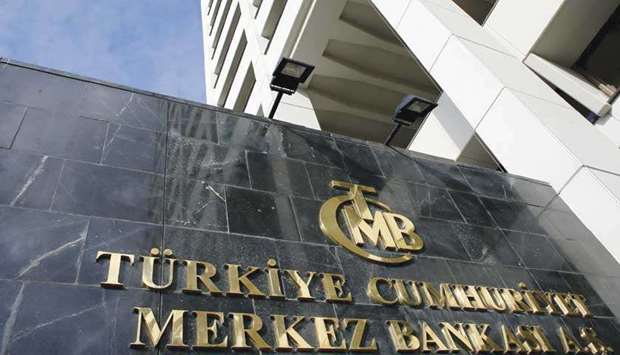Turkey’s central bank cut its key interest rate by 100 basis points on Tuesday at an earlier-than-scheduled policy meeting and took steps to support volatile financial markets, in an effort to defend the economy from the coronavirus epidemic.
Marking its seventh straight cut in an aggressive bid, the bank cut its benchmark one-week repo rate to 9.75% from 10.75%, pushing real rates deeper into negative territory.
The lira weakened to 6.4900 against the dollar after the move, bringing its losses so far this year to 8%.
The central bank said that despite the lira’s slide, the fall in commodity prices along with the global economic slowdown due to the virus will help lower Turkish inflation more than expected, clearing the way for the monetary easing.
The country’s key inflation measure has risen above 12%. The bank has predicted it will fall to 8.2% by year end.
“In order to contain negative effects of the coronavirus pandemic on the Turkish economy, it is of crucial importance to ensure the healthy functioning of financial markets, the credit channel and firms’ cash flows,” the bank said.
The bank announced several measures to effectively flood the financial sector with cheap lira liquidity, including an interest rate 150 basis points lower than the benchmark one-week repo rate through repo auctions with maturities up to 91 days.
It would also provide lenders with as much liquidity as needed through intraday and standing overnight facilities, as Turkey faces what analysts said were difficult times, in particular for tourism, which accounts for 12% of the economy.
Central banks around the world have ramped up stimulus in recent weeks in an effort to curb an expected sharp downturn from the pandemic.
Turkey, which is also expected to announce fiscal stimulus this week, has 47 reported coronavirus cases.
“If anything, the coronavirus outbreak provides them some justification to lower rates,” said Jason Tuvey, senior emerging markets economist at Capital Economics.
“But given the country’s poor external position, high inflation, the limit to how much easing the market will tolerate, they might end up going too far and (cause) a backlash in the currency market that will ultimately cause them to reverse course.” A Reuters poll showed economists raising expectations of a sharper cut in recent days, with a median of 75 basis points.
Inflation has fallen from a peak above 25% after the crisis, which cut the lira’s value by nearly 30% in a year.
Economic growth all but disappeared in 2019.
The central bank responded to the crisis by raising its policy rate to 24%, where it had stayed until last July.
Among other measures announced on Tuesday — two days before its scheduled policy meeting — the central bank said forex reserve requirement ratios will be broadly cut by 500 basis points for lenders that meet real credit growth conditions. These lenders will be provided with some $5.1bn of forex and gold liquidity, the central bank said.
One trader said the series of steps may diminish the central bank’s reserves, starting with $5bn cut from its gross reserves due to the forex measure. The central bank said conventional swap auctions with maturities of one, three and six months, which are currently available against US dollars, may also be held against euros and gold.
The bank also moved to backstop companies’ international trade in the face of global economic uncertainty, saying up to $7.6bn of rediscount credit repayments could be postponed by up to 90 days.

Turkey’s central bank headquarters is seen in Ankara (file). Marking its seventh straight cut in an aggressive bid, the bank cut its benchmark one-week repo rate to 9.75% from 10.75%, pushing real rates deeper into negative territory.
